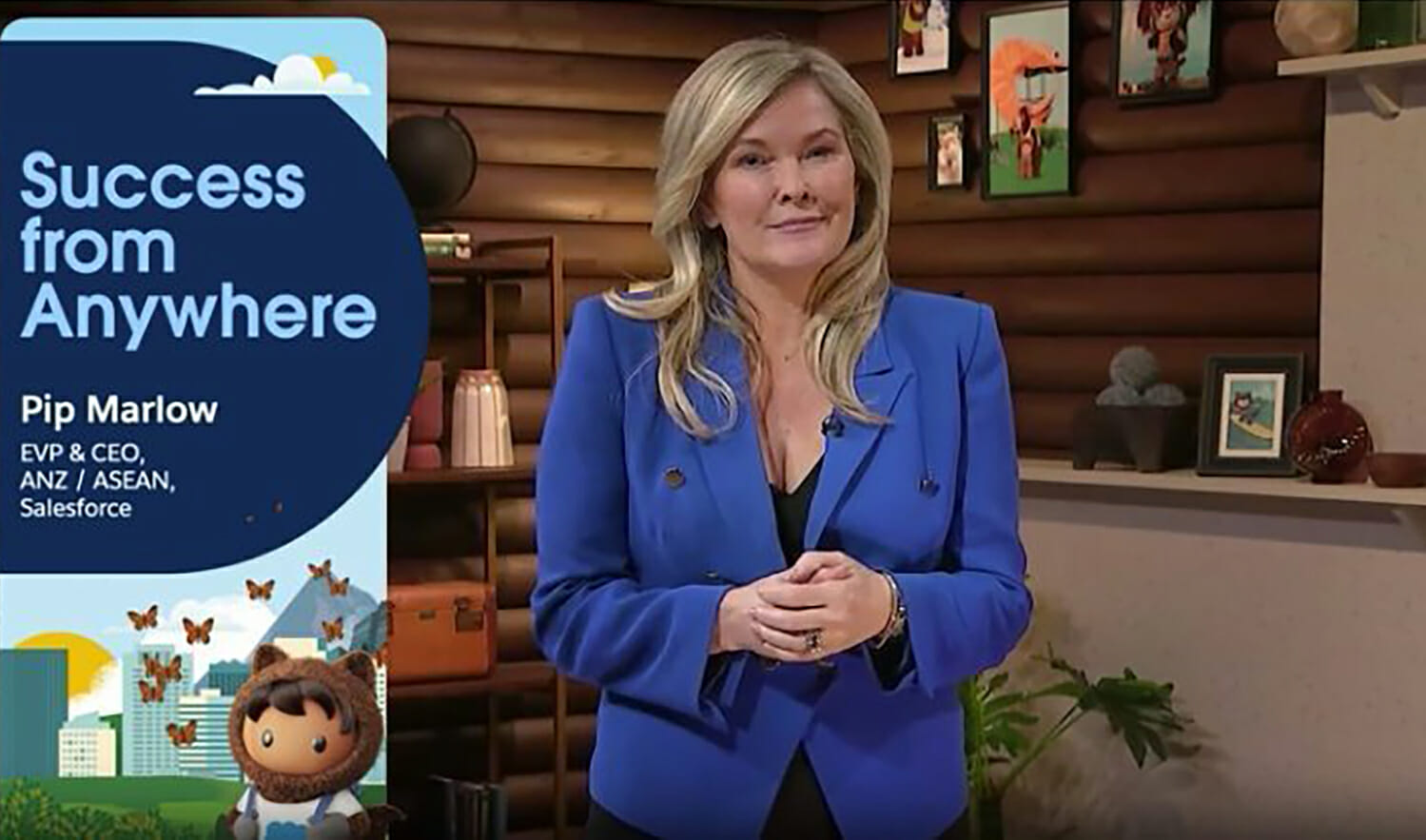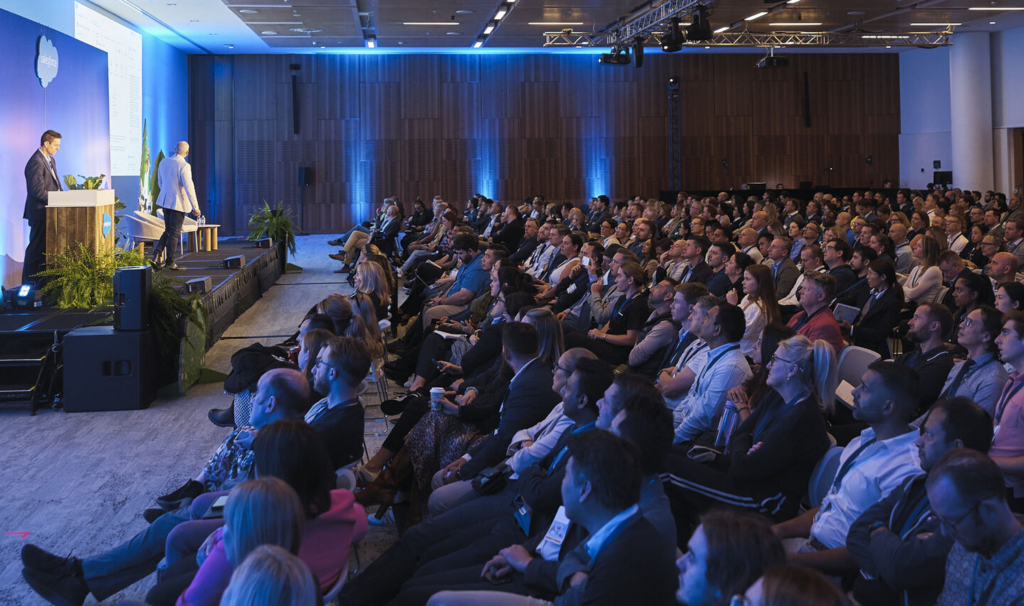This year’s Salesforce Live was jam-packed with big conversations, product demos and new platform features. But if you haven’t been able to tune in, we’ve pulled out some of the biggest lessons from all sessions.
Most of those lessons focused on the growing importance of personalisation, improved experiences, AI-enabled efficiencies, and the urgent need for businesses to digitise. Those aren’t exactly the kinds of things you can achieve in an afternoon, though. That’s why we’ve asked our subject matter experts for additional commentary and guidance on how to get started.
Want to jump to a topic that interests you?
Marketing and digital experience
In this session, we heard from beauty brand and marketing heavy-hitter Mecca, along with plenty of discussion about the importance of tailoring customer journeys at every step. Less explicit was the blurring of traditional boundaries between marketing and other business functions, as a focus on personalised customer experience takes centre-stage.
Our Director of Marketing, Business Development and Alliances, Danielle Ozolins, conceded that just because personalisation is crucial doesn’t mean it’s easy. Much of it depends on data quality and integrations that can sometimes feel outside a traditional marketing scope. But she pointed out that even baby steps can have a massive impact.
“You can’t boil the ocean, but you can get started with first steps and pilots.”
So what would first steps entail? Danielle explains that personalisation is all about data, so you’ll want to target data centres, unify data sources through integration solutions like Mulesoft, and clean your data. Another important step is mapping the customer journey end-to-end, which will touch almost every part of the business, so you’ll have to be willing to get cross-functional.
If this sounds like a lot, Danielle explains that you can start with smaller customer segments.
“Pick an area you know best. That will make it easier to construct a clear understanding of your customers and then validate what you know against insights from your sales or service teams.”
And if that still sounds like a lot, she reiterates that Salesforce is modular, so it’s especially easy for marketers to start with something small. Simplus has advisory services, too, so there’s no need to feel you’ve been left to boil any oceans by yourself.
Service and customer experience
This episode saw Telstra leaders explaining their ongoing service transformation journey, along with research insights that suggest a changing role for service functions.
Salesforce’s latest iteration of its State of Service report indicated growing complexity in service cases during the pandemic, along with a shift toward digital channels, self service and automation that frees service agents to focus on those trickier customer problems.
Those trends tracked closely against Telstra’s story, with its Director of Service and Agent Experience explaining that they’ve had to be careful to ensure that each interaction is layered with data from other interactions:
“It’s great to have all these digital channels, but if they’re not stitched together nicely and the agent hasn’t got the right information, it’s gonna be frustrating.”
Simplus’ own Dimity Dixon, Senior Account Executive, says this is an important call-out as businesses try to reckon with a digital-first world and a growing number of channels and touchpoints.
“A number of businesses in enterprise run into problems after investing in a huge variety of solutions. If these are implemented within silos and not properly integrated with backend systems, then data might still be tracked and captured differently.”
Dimity cautions businesses to remember that technology is only one piece of the puzzle, keeping in mind the role of culture, processes and people. “Salesforce technology is always going to work. But if businesses don’t understand the outcomes they’re looking to achieve for their customer and for their organisation, then the investment can fall over.”
While clear objectives and a holistic strategy of change are critical, the right tools are still important, especially within new working environments. For instance, equipping service professionals with better platforms was a regular point of discussion during Salesforce Live: A new feature of the spring release, Salesforce Anywhere, could be part of the answer, providing video calling within the Salesforce platform and predictive guidance in the form of Next Best Actions for service cases.
Financial services
A big takeaway from the financial services episode was the blending between financial services companies and technology companies. But for those in a more traditional and highly regulated vertical, or in a long-established business, tweaking your business model can be tricky. Damian Martina, Account Executive at Simplus, had some advice.
“For organisations that are just starting their digitisation journeys, one of the most critical pieces of advice is to first identify their desired outcome and keep that in the focus of every decision,” he says. “That means being open to the possibility of re-engineering processes to better fit a solution.”
Still, Damian emphasises that it doesn’t mean you absolutely will need to re-engineer every process. Instead, the ability to transform and meet consumers’ digital experience expectations will rely on the willingness to question why processes happen a certain way.
“Just because you started doing something in a pre-digital space doesn’t mean it needs to change. It’s not about reinventing the entirety of your operations, it’s just about understanding which financial services rules may no longer be applicable and being willing to consider whether processes are the best way to achieve your desired outcomes in a digital world.”
As an example, Damian cites the industry’s previous reticence to expose information to customers. But we’ve seen that arming customers with more information and enabling self service tends to make customers feel more confident, more engaged and less likely to churn.
“It’s just one example of how traditional approaches in financial services are changing fast,” says Damian. “That’s why it’s important to be open, and it’s where a lot of organisations are already headed. But if an organisation is new to digital transformation projects, that’s where it can be really beneficial for an external partner to guide them through that change.”
Retail and consumer goods
Though it was a regular theme in every episode, the urgent need to digitise was perhaps strongest during this session. Simplus Account Executive Carlos Bravo reiterates this as one of the most important takeaways for retailers.
“Before the technology we have now, retail was almost at a horse-and-cart type of stage. Well, now the sports car has come along, and if you’re not a sports car then you need to be looking at this technology very seriously or you risk getting left behind,” he says.
Those “sports cars” are already standing out with hyper-personalised, omni-channel experiences that depend on a single, unified view of customers. But it’s no small feat in retail, where the number of touchpoints is huge and there’s a heightened need for each one to contribute to a coherent, connected experience.
“This is where elements of Salesforce become crucially important,” explains Carlos. “Like Customer Data Platform, which collects data from a huge variety of sources, like social media, websites, chat, and so on. It centralises it all in one place.”
True connection and seamless experiences are important aspirations, but Carlos points out the ultimate vision tends to go one step further and into predictive solutions, like Einstein Vision, that uses machine learning to pick out visuals, logos, and products. First, though, businesses have to get the basics right, and that requires connecting not just customer information but also additional data like inventory information.
“A lot of this starts with creating a roadmap and assessing data readiness,” says Carlos. “We can help at just about any stage and meet businesses where they’re at. Our parent company Infosys also offers additional value since the partnership means we can advise on end-to-end solutions that pull in more than customer data alone.”
Government and public sector
In the government episode, a frequent topic of conversation was the relationship between improved digital service delivery and citizen trust in government – a link supported by recent research by Salesforce and Boston Consulting Group. As agencies improve digital conveniences and user experiences, trust and willingness to share data improve.
Our Regional Sales Director, Curtis Williams, had a few extra call-outs for leaders to keep in mind. One was that the demand for digital services will only continue to solidify as “the default,” requiring smarter digitisation, less manual processes and shorter development lifecycles. This will be critical for meeting consumer expectations and building trust, but also for accelerating project delivery, reducing costs and minimising compliance risks.
Another was that, while citizen-centricity is vital, agencies also have to find more efficient ways to approach inter-agency programs of work. Agencies increasingly rely on working with other agencies, suppliers and private sector partners.
That means they need to transform in ways that are agile and repeatable. The session also delved into creating platforms that can be repurposed, such as the New Zealand Ministry of Health, which repurposed a cancer screening platform for its COVID-19 response.
“The key is that these projects require purpose-built platforms that can be tailored and go live in weeks, not months,” explained Curtis.
So where does Salesforce come in? Well, the session covered ‘why’ agencies have to care about digital-first platforms and improved service delivery, and how offerings like Salesforce’s Public Sector Solutions can provide the ‘how’. It offers pre-built data model components and a toolkit to enable customer-centric solutions in areas like grants management or emergency program management, all on a single platform.
Of course, you probably already know that agency-wide transformation isn’t as simple as unboxing a product, which is why we can share insights and help navigate where to get started.
Take your next step
No matter how much you read or research, you’ll always know your one-of-a-kind organisation best, and solutions often need some sort of tailoring or special considerations. That’s why it can be helpful to speak directly with a specialist about your unique challenges or goals.





